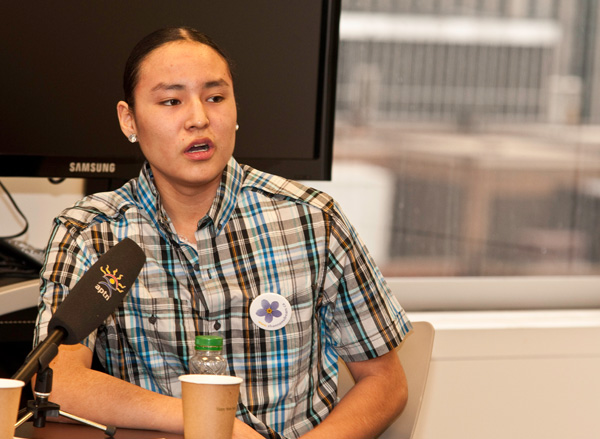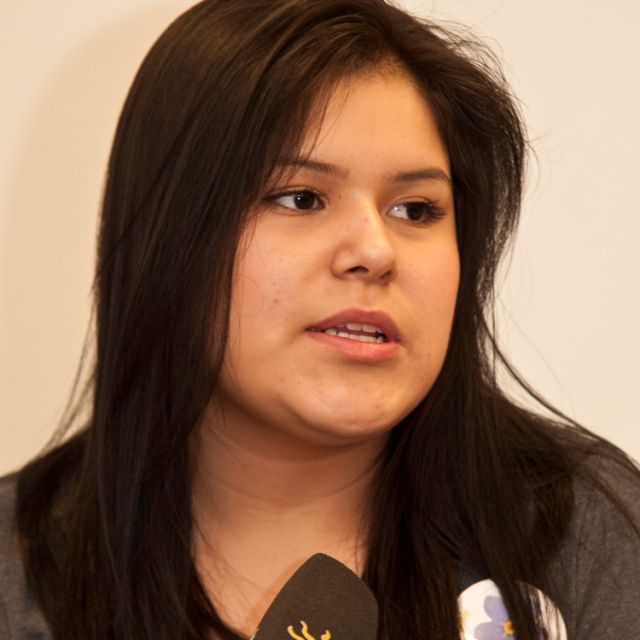The young people want to hold their government to account, said 16-year-old Chelsea Edwards from Attawapiskat First Nation near James Bay.
"They simply haven't taken responsibility, so we want to go to the United Nations and tell people," said the young spokeswoman for the Shanen's Dream campaign for equal funding for native education.
The delegation is going to Geneva with the backing of KAIROS and the First Nations Child and Family Caring Society of Canada. KAIROS is supported by Canada's largest Christian bodies, including the Canadian Conference of Catholic Bishops and several Catholic religious orders.
The delegates ranging in age from 15 to 24 will speak about barriers aboriginal children in Canada face in education and foster care. A joint report from KAIROS and First Nations Child and Family Caring Society to the United Nations lays out shortcomings in the funding and effectiveness of federal government programs in both areas.
Schools on reserves get between $2,000 and $3,000 less per student than provincially funded schools, according to a 2008 Caledon Institute report. And fewer than half of First Nations schools are in good condition, according to a 2009 Parliamentary Budget Office report. At the same time, new school construction on reserves has slowed down. Compared to 35 new reserve schools built between 1990 and 2000, only eight have been built since 2006.
Annual increases in federal funding for native education have been capped at two per cent since 1996 despite the boom in the aboriginal birth rate. Half of Canada's First Nations population is under the age of 25. For Inuit, the median age is 20.

Collin Starblanket is another of the youth who will speak to a UN Committee on the Rights of the Child. The six delegates range in age from 15 to 24.
Photo by Michael Swan
Staggering numbers of aboriginal kids end up in foster care. Depending on the reserve, it can be anywhere from zero to 28 per cent of the children in a native community in care, according to a 2008 Auditor General's report. In general, the Auditor General found that on-reserve children were in care at eight times the rate of off-reserve children. First Nations Child and Family Services has told the Standing Committee on the Status of Women that native kids in foster care are underfunded by 22 per cent compared with off-reserve children.
An access to information request revealed that government lawyers are worried that Indian and Northern Affairs Canada could be successfully sued "as a consequence of providing inadequate prevention resources" in its foster care system.
It's not the funding formulas the young delegates are going to fight for in Geneva, according to 17-year-old Kendall White of the Temagami First Nation between North Bay and Timmins, Ont. White wants to fight for the kids trying to get through school and become successful adults.
"They shouldn't have to fight for a school. They shouldn't have to worry about their friends committing suicide. That isn't right," said White.
Julie Graham, KAIROS campaign program co-ordinator, can't imagine that churches wouldn't support the youth delegates to the United Nations.
"I would hope children's rights matter to the churches," she said.
She called a better future for native children a "Gospel imperative."
Young First Nations people are perfectly willing to work with Canada's churches, providing it's an equal partnership, said Chalykoff.
"As long as they're not seen as dominating; as long as they're seen as partners," he said.
For KAIROS indigenous rights program co-ordinator Ed Bianchi it makes perfect sense that the Church help young aboriginals make the case before the United Nations Committee on the Rights of the Child.
"Notwithstanding all the impacts the (residential) schools had and continue to have, this is a ray of hope," he said.


